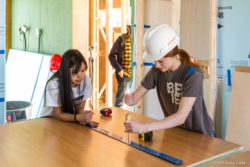Appalachian State University Students Compete In Solar Decathlon Europe

Team REC decathletes working together to prepare a CFP panel.
St. Louis, Mo. — Appalachian State University (ASU) student fingerprints literally and figuratively cover every aspect of their student-designed-and-built as well as “reimagined” row house that is sailing to France to compete against 20 global teams in the Solar Decathlon Europe 2014.
To reduce their environmental footprint, the students chose soy-biobased products.
Soy-based, formaldehyde-free plywood as well as durable floor matting are important features of Maison Reciprocity, ASU’s solar-powered row house developed with their partner school, the Université d’Angers (U d’A). The Boone, North Carolina University is one of three U.S. schools chosen for this complementary competition to the U.S. Department of Energy Solar Decathlon.

Team REC decathletes carry CFP panel in negative degree weather.
“We congratulate these students on their innovation and leadership for sustainability,” said United Soybean Board Customer Focus Action Team Chair John Motter. “People around the world will learn from their example.”
The students worked day and night to design and build the house that they will also disassemble and ship to France from Norfolk, Virginia on May 16. Once in Versailles, students from both universities will unite to reassemble and then compete in the house that offers multiple environmental attributes for all.
Students used 1,700 square feet of Columbia Forest Products’ PureBond® hardwood plywood made with its soy-based formaldehyde-free adhesive on floors, walls and stairs. The product won the Environmental Protection Agency’s (EPA) Presidential Green Chemistry Award. Formaldehyde is classified as a known human carcinogen by the National Toxicology Program, an interagency program of the U.S. Department of Health and Human Services. According to the EPA, formaldehyde can also cause eye, nose and throat irritation as well as respiratory problems.

CFP finish panels in the upstairs mechanical room of Maison Reciprocity
“These panels not only provide an attractive finish, but the fact that they are formaldehyde free is an important attribute that will help our entry compete in the ambient air quality portion of the competition,” said Mark Bridges, a graduate student at ASU and the communications manager for the project.
“The floor mat, basically a 30-feet-long runner, will protect the floors from the large amount of foot traffic that the home will experience during its weeks of open houses,” Bridges says.
EcoPath™ and the USB provided the mat backed with EnviroCel™, which uses soy as well as recycled plastics. The mats are widely used at the Pentagon and other major facilities with very heavy foot traffic.
Learn more about Maison Reciprocity.
